
Links
StoryCorps, the award-winning national oral history project, has launched a new campaign called #WhoWeAre to feature stories of hope and compassion. Some have a surprising twist. We feature two stories: one of Bronx social worker Julio Diaz, who was coming home from work when he had an encounter with a teenager who held him up at knifepoint, and an exchange between a father and son about living out their dreams.
Transcript
AMY GOODMAN: This is Democracy Now!, democracynow.org, The War and Peace Report, as we wrap up today’s show. Juan?
JUAN GONZÁLEZ: Well, we end with a new project from StoryCorps, the award-winning national social history project, the largest oral history project in the United States. Tens of thousands of people have recorded interviews with their loved ones in StoryCorps booths across the country.
AMY GOODMAN: Now StoryCorps has launched a new campaign called #WhoWeAre to bring stories of hope and compassion, some with a surprising twist. One is the story of Bronx social worker Julio Diaz, who was coming home from work when he had an encounter with a teenager who held him up at knifepoint. This is the unusual way Julio reacted.
JULIO DIAZ: So I get off the train. You know, I’m walking towards the stairs, and this young teenager pulls out a knife. He wants my money. So I just gave him my wallet and told him, “Here you go.” He starts to leave, and as he’s walking away, I’m like, “Hey, wait a minute, you forgot something. If you’re going to be robbing people for the rest of the night, you might as well take my coat to keep you warm.”
So, you know, he’s looking at me like, “What’s going on here?” You know? And he asked me, “Well, why are you doing this?” And I’m like, “Well, I don’t know, man. If you’re willing to risk your freedom for a few dollars, then I guess you must really need the money. I mean, all I wanted to do was go get dinner. And if you really want to join me, hey, you’re more than welcome.” So I’m like, “Look, you can follow me if you want.” You know, I just felt maybe he really needs help.
So, you know, we go into the diner, where I normally eat. We sit down in the booth, and the manager comes by, the dishwashers come by, the waiters come by to say hi, you know? So, the kid was like, “Man, but you know everybody here. Do you own this place?” I’m like, “No, I just eat here a lot.” He’s like, “But you’re even nice to the dishwasher.” I’m like, “Well, haven’t you been taught you should be nice to everybody?” So he’s like, “Yeah, but I didn’t think people actually behaved that way.”
So I just asked him in the end; I’m like, you know, “What is it that you want out of life?” He just had almost a sad face. Either he couldn’t answer me or he didn’t want to. The bill came, and I look at him, and I’m like, “Look, I guess you’re going to have to pay for this bill 'cause you have my money and I can't pay for this, so if you give me my wallet back, I’ll gladly treat you.” He didn’t even think about it. He’s like, “Yeah, OK, here you go.” So I got my wallet back. And I gave—you know, I gave him $20 for it. You know, I figure maybe it’ll help him. I don’t know. And when I gave him the $20, I asked him to give me something in return, which was his knife. And he gave it to me.
You know, it’s funny, 'cause when I told my mom about what happened—you know, no mom wants to hear this, but with her, she was like, “Well, you know, you're the type of kid that if someone asked you for the time, you gave them your watch.” I don’t know. I figure, you know, you treat people right, you can only hope that they treat you right. It’s as simple as it gets in this complicated world.
JUAN GONZÁLEZ: That’s Julio Diaz, one of the many voices in StoryCorps’s new #WhoWeAre campaign.
AMY GOODMAN: And we end with another story that hasn’t been released by StoryCorps yet. This is nine-year-old Aidan Sykes, who sat down to ask his father, Albert, a few questions.
AIDAN SYKES: Do you remember what was going through your head when you first saw me?
ALBERT SYKES: I remember when the doctor pulled you out, the first thing I thought was that he was being too rough with you. And he actually held you like a little Sprite bottle. And he was like, “Here’s your baby.” That was the most proud moment in my life. Don’t tell your brothers, because there’s three of y’all. But it was like looking at a blank canvas and just imagining what you want the painting to look like at the end, but also knowing you can’t control the paint strokes. You know, the fear was just I got to bring up a black boy in Mississippi, which is a tough place to bring up kids, period. But there are statistics that say black boys born after the year 2002 have a one-in-three chance of going to prison. And all three of my sons were born after the year 2002.
AIDAN SYKES: So, Dad, why do you take me to protests so much?
ALBERT SYKES: I think I take you for a bunch of reasons. One is that I want you to see what it looks like when people come together, but also that you understand that it’s not just about people that are familiar to you, but it’s about everybody. Did you know the work that Martin Luther King was doing was for everybody, and it wasn’t just for black people?
AIDAN SYKES: Yes, I understand that.
ALBERT SYKES: Yeah. So that’s how you’ve got to think. If you decide that you want to be a cab driver, then you’ve got to be the most impactful cab driver that you can possibly be.
AIDAN SYKES: Are you proud of me?
ALBERT SYKES: Of course. You’re my man. I just love everything about you, period.
AIDAN SYKES: The thing I love about you, you never gave up on me. That’s one of the things I will always remember about my dad.
ALBERT SYKES: Wow, you say that like I’m on the way out of here or like I’m already gone.
AIDAN SYKES: So, Dad, what are your dreams for me?
ALBERT SYKES: My dream is for you to live out your dreams. There’s an old proverb that talks about when children are born, children come out with their fists closed, because that’s where they keep all their gifts. And as you grow, your hands learn to unfold, because you’re learning to release your gifts to the world. And so, for the rest of your life, I want to see you live with your hands unfolded.
AMY GOODMAN: That was nine-year-old Aidan Sykes, who sat down with his dad, Albert, to ask him a few questions for StoryCorps, the largest oral history project in the United States. Special thanks to Dave Isay. We’ll be playing some of these throughout next week.

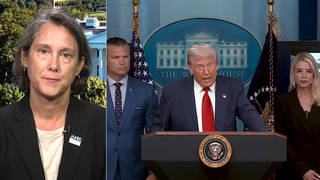
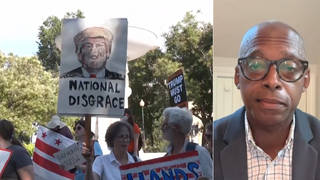
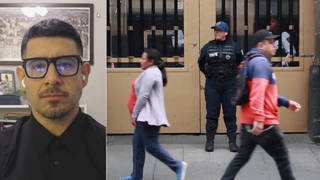
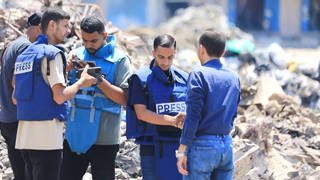





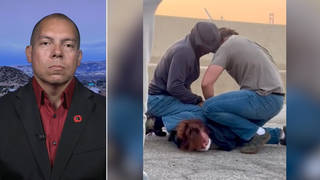

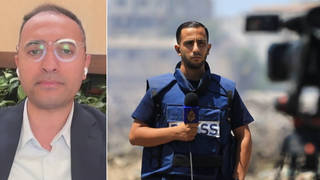
Media Options